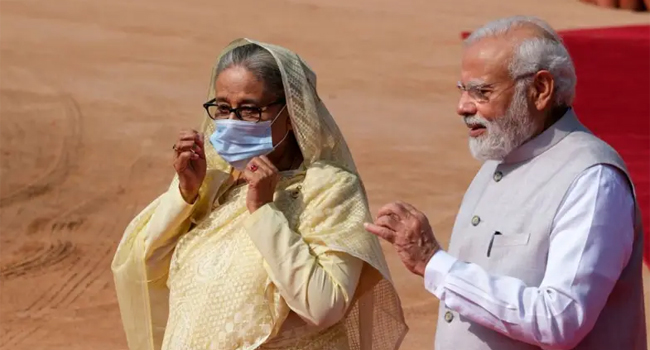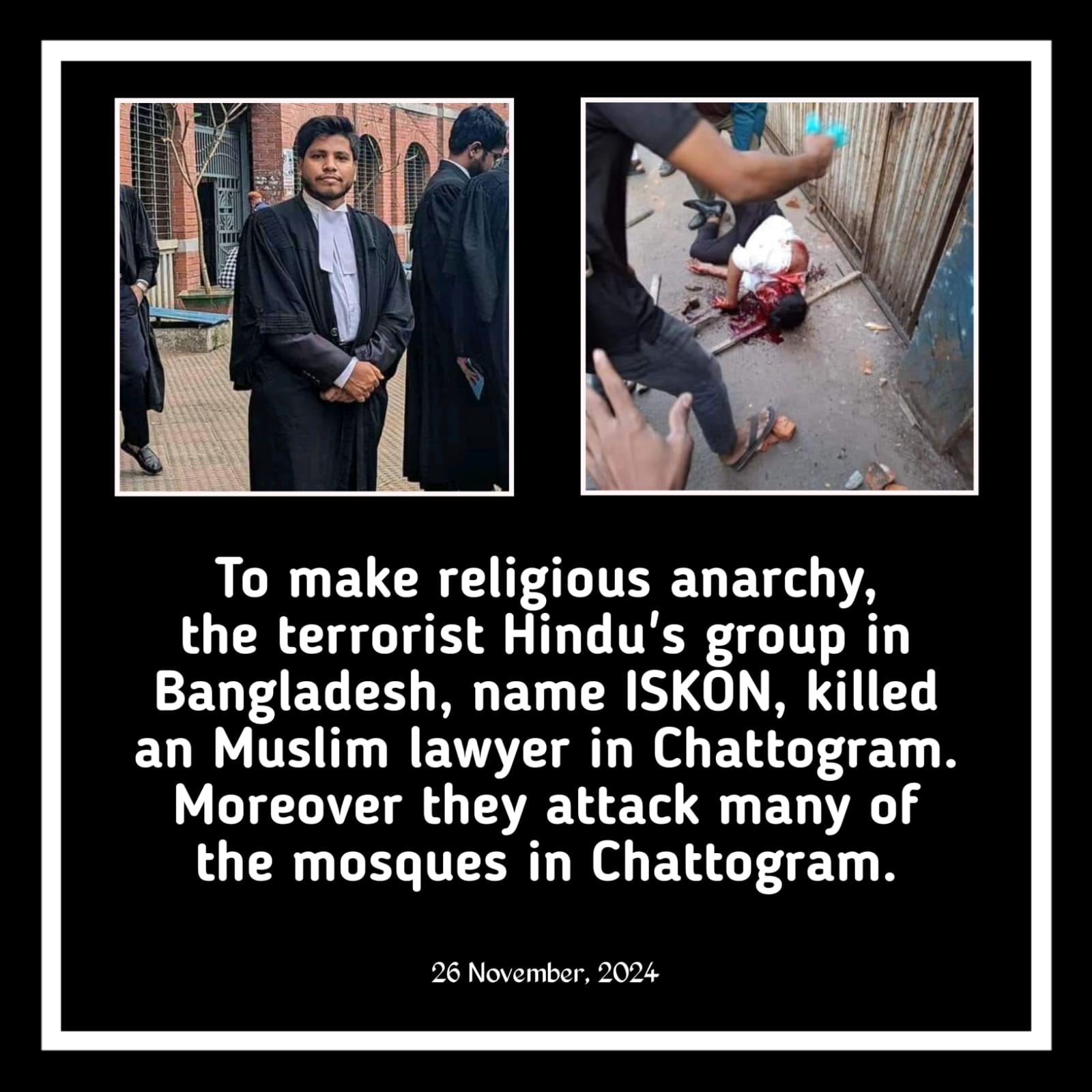The former Prime Minister of Bangladesh, Sheikh Hasina, who was still in office last month, has now been in India for over three weeks. The Indian government has provided her (along with her younger sister, Sheikh Rehana) with a place to stay under tight security and considerable secrecy, but no official announcement has yet been made regarding the final decision about her situation.
Meanwhile, last week, the Bangladesh government decided to revoke Sheikh Hasina’s diplomatic or official passport, raising questions about the legal basis of her continued stay in India.
Given this backdrop, conversations with senior government officials and analysts in Delhi suggest that India currently has three viable options concerning Sheikh Hasina.
The first option is to arrange asylum for the former Bangladeshi Prime Minister in a third country, where she can be assured of safety and security.
The second option is to grant Sheikh Hasina political asylum in India and allow her to stay for the time being.
The third option, although perhaps not immediately feasible, is believed by some officials and observers in India to be a potential future strategy. Should the circumstances in Bangladesh become favorable, India might facilitate Sheikh Hasina’s “political return,” since the Awami League, as a political entity, is far from defunct, and she could resume leadership upon her return to the country.
Among these, the first option is widely regarded in diplomatic and think tank circles as the most favorable, as keeping her in India could adversely impact future India-Bangladesh relations.
Additionally, if Dhaka formally requests Hasina’s extradition under the India-Bangladesh extradition treaty, it is almost certain that Delhi would reject such a request for various reasons.
Therefore, handing Sheikh Hasina over to Bangladesh for prosecution is not seen as a realistic option by observers.
In short, India faces three potential paths concerning Sheikh Hasina, whether in the short or long term.
This report will examine the pros and cons, strengths, weaknesses, and feasibility of each of these options.
Considering a Third Friendly Country?
According to the latest official statement from India, Sheikh Hasina’s current stay in India is “temporary.”
When Indian Foreign Minister S. Jaishankar addressed the situation in Bangladesh in parliament on August 6, he used the phrase “for the moment,” indicating a temporary situation, and since then, the Indian government has not issued any further statements on the matter.
This is because efforts to send Sheikh Hasina to a safe third country are still in full swing. However, if this does not quickly come to fruition, Delhi will not hesitate to grant her political asylum and allow her to stay in India for as long as necessary.
As a senior official from the Ministry of External Affairs of India noted, “We are hoping for the best, preparing for the worst!”
This indicates that India still hopes for the best outcome regarding Sheikh Hasina (i.e., she will find refuge in a third friendly country), but if that proves impossible, Delhi will be prepared to host her for an extended period.
It has been reported that after her initial proposal to go to the United Kingdom was blocked, India discussed the matter with the UAE, Saudi Arabia, and a few small European countries.
However, there has been little progress in these discussions. Subsequently, it appears that India has begun talks with another influential Middle Eastern country, Qatar, regarding offering refuge to Sheikh Hasina.
Nonetheless, it is also true that Sheikh Hasina herself has not yet submitted a formal written request to any country. This includes neither the United Kingdom nor the United States, nor any of the other countries mentioned. All discussions are being conducted by the Indian government on her behalf and with her verbal consent.
Now the question arises: If a third country agrees to grant Sheikh Hasina asylum, what passport will she use to travel there from Delhi?
Riva Ganguly Das, former High Commissioner of India to Bangladesh, commented, “This is not a major issue. Even if the Bangladesh government has revoked her passport, she can easily travel to a third country using a travel document or permit issued by the Indian government. For example, there are thousands of Tibetan refugees in India who have never taken an Indian passport. India issues a travel document (TD) to these foreigners, which they use to travel all over the world.”
In other words, if country ‘X’ agrees to grant asylum to Sheikh Hasina, she can easily travel to and reside in that country if the embassy of ‘X’ in Delhi issues her a visa on the travel document provided by India.
Riva Ganguly Das adds, “These rules apply to ordinary individuals. We must remember that Sheikh Hasina has a significant political profile, which could simplify the regulations in her case!”
Granting Political Asylum?
There are also indications in Delhi that India would not hesitate to grant Sheikh Hasina political asylum and allow her to remain in the country if absolutely necessary.
In the past, India has granted political asylum to many foreign leaders, including the Tibetan spiritual leader Dalai Lama, Nepal’s King Tribhuvan Bir Bikram Shah, and Afghan President Mohammad Najibullah. Sheikh Hasina herself received hospitality from India with her family in 1975.
However, if this step is indeed taken, Delhi must consider its impact on India-Bangladesh bilateral relations.
Observers point out that the bitterness in India-China relations following the granting of political asylum to the Dalai Lama in 1959 has persisted for over 65 years.
While the Dalai Lama is highly respected in India and internationally, he has remained a consistent “thorn of discomfort” in the relationship between Delhi and Beijing.
Many analysts in India also believe that granting asylum to Sheikh Hasina could hinder the development of relations with the new government in Bangladesh.
Smruti Patnaik, a senior fellow at IDSA in Delhi, explains, “The movement that led to the fall of Sheikh Hasina’s government also had a distinctly anti-India stance. It was both an anti-Hasina movement and an anti-India one!”
She adds, “Now, if that very India grants her asylum, it will send a wrong message to Bangladesh and certainly fuel anti-India sentiment.”
The Indian government is well aware of this problem. Nonetheless, if the first option does not work, they may be forced to consider the second option, as it would be unthinkable not to stand by Sheikh Hasina, a long-time friend, in her time of need.
Assisting in a Political Comeback?
At the highest levels of the Indian government, there is a faction that still believes Sheikh Hasina has not been entirely “written off” from the political landscape of Bangladesh, and that when the time and environment are right, India should assist in her “political rehabilitation.”
An official who believes in this line of thinking said, “We must remember that Sheikh Hasina has made three formidable comebacks in Bangladeshi politics—in 1981, 1996, and 2008! On all three occasions, many thought it might be impossible for her to bounce back, but each time she proved them wrong!”
However, it is also worth noting that she was much younger at those times, and she is now over 76 and will turn 77 next month; could this be a hindrance?
In response, the official remarked, “Age may not be entirely on her side, but if Muhammad Yunus could become the head of government for the first time at the age of 84, why should we assume that Sheikh Hasina, who is much younger, cannot do the same?”
The fundamental point is that Sheikh Hasina might one day return to Bangladesh and once again take charge of the Awami League. A segment in Delhi firmly believes this could be a realistic possibility.
They argue that India might need to exert pressure on the interim government of Bangladesh, and if necessary, on the military, to facilitate her return.
They also point out that the Awami League is not a banned organization in Bangladesh and has a strong nationwide network—Sheikh Hasina, as the party’s top leader, could very well return to Bangladesh in the future.
She could also face the charges filed against her, and there might be obstacles to her running in the next election. However, preventing her return to the country and barring her from re-entering politics would be challenging, according to this faction’s viewpoint.
Political scientist and professor of international relations at O.P. Jindal Global University, Sreeradha Datta, believes that while India might offer tacit support to rejuvenate the Awami League, rehabilitating Sheikh Hasina would be a much more challenging task.
She notes, “In the near future, I don’t see the Awami League making a comeback with Sheikh Hasina at the forefront. The Awami League will certainly survive as a political force because eradicating it completely is not easy, but there is no option but to bring about a significant change in the party’s leadership!”
Therefore, regardless of when the next election in Bangladesh takes place, she does not consider the Awami League contesting under Sheikh Hasina’s leadership to be a realistic scenario.
However, given the political investment India has made in Sheikh Hasina over the past nearly 50 years, a significant faction in Delhi is unwilling to write her off just yet.
After the Passport Revocation
Last week, a report by BBC Bangla stated that when Sheikh Hasina left the country, her diplomatic passport was still valid, allowing her to stay in India for at least 45 days without a visa.
The day after this report was published on the BBC, Bangladesh’s interim government hastily announced the revocation of all diplomatic passports issued in the names of Sheikh Hasina and the ministers and MPs from the previous Awami League era.
This raises the question: What is the legal basis for Sheikh Hasina’s continued stay in India after the passport revocation?
Pinak Ranjan Chakravarty, a former senior Indian diplomat who headed the Protocol Division of the Ministry of External Affairs for many years, clarifies that Sheikh Hasina’s current stay in India is “technically entirely legitimate.”
He states, “Even if the Bangladesh government has canceled her passport, Sheikh Hasina is now in India on an Indian special permit. A similar travel permit was once granted to the former Chief Justice of Pakistan, Iftikhar Chaudhry, when he fled from General Musharraf’s rule to India, and this travel permit served as his document of identity.”
“In the case of Sheikh Hasina, something similar has been done. She was given a special permit as soon as she crossed the border from Bangladesh. As a result, there is no question of her stay being illegal!”
He further states that as long as the issue remains unresolved, she could continue to live in India indefinitely with the Indian government’s consent.
However, the reality remains that if this “temporary arrangement” becomes long-term, it could have long-term consequences for India-Bangladesh bilateral relations.
This is why India is exploring the possibility of arranging asylum for Sheikh Hasina in a third country. Still, if that fails, they might consider granting her political asylum and temporarily allowing her to reside in India.
Despite this, another faction in Delhi believes Sheikh Hasina still has a significant political role to play in Bangladesh. They also believe India could facilitate her return when the time is right.
Consequently, the Indian government is still seriously considering all three options.
Source: BBC Bangla










